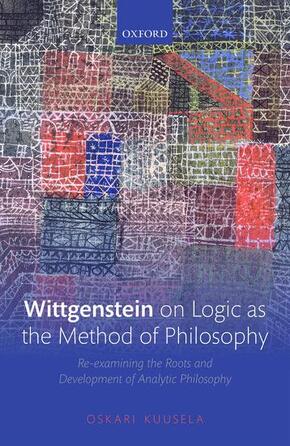Wittgenstein on Logic as the Method of Philosophy - Re-examining the Roots and Development of Analytic Philosophy
| Verlag | Oxford University Press |
| Auflage | 2019 |
| Seiten | 312 |
| Format | 15,2 x 24,2 x 2,2 cm |
| Print PDF | |
| Gewicht | 605 g |
| Artikeltyp | Englisches Buch |
| ISBN-10 | 0198829752 |
| EAN | 9780198829751 |
| Bestell-Nr | 19882975EA |
Oskari Kuusela explores Wittgenstein's account of logic in the context of the history of analytic philosophy. He presents Wittgenstein as developing the logical-philosophical approaches of his contemporaries and credits him with resolving the long-standing dispute between the ideal language and ordinary language schools of analytic philosophy.
In Wittgenstein on Logic as the Method of Philosophy, Oskari Kuusela examines Wittgenstein's early and late philosophies of logic, situating their philosophical significance in early and middle analytic philosophy with particular reference to Frege, Russell, Carnap, and Strawson. He argues that not only the early but also the later Wittgenstein sought to further develop the logical-philosophical approaches of his contemporaries. Throughout his career Wittgenstein's aim was to resolve problems with and address the limitations of Frege's and Russell's accounts of logic and their logical methodologies so as to achieve the philosophical progress that originally motivated the logical-philosophical approach. By re-examining the roots and development of analytic philosophy, Kuusela seeks to open up covered up paths for the further development of analytic philosophy. Offering a novel interpretation of the philosopher, he explains how Wittgenstein extends logical methodology beyond calculu s-based logical methods and how his novel account of the status of logic enables one to do justice to the complexity and richness of language use and thought while retaining rigour and ideals of logic such as simplicity and exactness. In addition, this volume outlines the new kind of non-empiricist naturalism developed in Wittgenstein's later work and explaining how his account of logic can be used to dissolve the long-standing methodological dispute between the ideal and ordinary language schools of analytic philosophy. It is of interest to scholars, researchers, and advance students of philosophy interested in engaging with a number of scholarly debates.
Inhaltsverzeichnis:
Introduction
1: Frege's and Russell's new logic: the promise of philosophical progress
2: The Tractatus' philosophy of logic and the logocentric predicament
3: The Tractatus' philosophy of logic and Carnap
4: Ideality and reality: beyond apriorism, empiricism and conventionalism
5: The method of language-games as a method of logic
6: Non-empiricist naturalism: the uses of natural history in logic
7: Resolving the dispute between ideal and ordinary language approaches
Epilogue
Rezension:
Overall, Kuusela's book is an excellent piece of scholarship... Forma de Vida




